Get Well Wednesday: Have A Heart

WHAT CAN YOU EAT TO DECREASE YOUR RISK OF HEART DISEASE?
A heart-healthy diet is one which is low in carbohydrates, cholesterol, and saturated fats but high in fiber, protein, and ‘good’ fats such as omega-3 fatty acids. A vegetarian diet which follows these principles is healthiest, however diets which include lean meats can also be healthy.
WHAT TYPE OF EFFECT DO FRIED FOODS HAVE ON OUR HEARTS?
Fried foods can lead to the accelerated development of plaque in arteries including those in the heart. These plaques can grow into frank blockages which can lead to heart attacks. Fried foods can also lead to high blood pressure which can predispose one to heart attacks and congestive heart failure.
WHAT ARE THE SYMPTOMS OF HEART DISEASE?
Symptoms of heart disease vary widely. Classically, they include chest pain radiating to the left arm, neck or jaw, chest tightness, and chest pressure (like an elephant is sitting on your chest). Others include shortness of breath, nausea / vomiting, sweating, cool / clammy skin, back pain, headache, dizziness, and prodrome of malaise (general sensation of not feeling well).
ARE THE SYMPTOMS OF HEART DISEASE THE SAME FOR MEN AS THEY ARE FOR WOMEN?
Women tend to have more of the subtle symptoms of heart disease than men such as back pain, headache, nausea / vomiting, and malaise. Therefore it is very important for women to aggressively seek evaluation of even vague symptoms such as these, because they could be heart-related.
AT WHAT AGE SHOULD WE START MONITORING OUR HEARTS?
I recommend initiating cardiac evaluations as early as 40 years old and would recommend it at 30 years old if you have a strong family history. Of note, in the past two months I have operated on two young men with heart disease in their 30’s and 40’s, both of whom had strong family histories of heart disease.
CAN YOU INHERIT HEART DISEASE IF OTHER FAMILY MEMBERS HAVE IT?
Absolutely. This is one of the strongest risk factors. As I suggest above, those with a family history of heart disease should aggressively seek evaluation at a younger age to catch it early.
TEXT YOUR QUESTIONS TO 646464 AND DR. HENRY WILL ANSWER THEM ON Blackamericaweb.com
Dr. Henry was born in Anderson, IN to parents who both worked in General Motors factories. He was honored to serve as senior class president and captain of the football team in high school there. He then attended Indiana University where he continued to play football and graduated with honors with a Bachelor of Science in Biochemistry in 3 years. His education continued at Washington University School of Medicine in St. Louis, MO.
Henry did his general surgery residency at the Detroit Medical Center / Wayne State University in Detroit, MI. While there he completed a Ph.D in molecular medicine and genetics and had the opportunity to present his thesis work in China and at multiple centers in the U.S.
Also, during his residency, he joined the U.S. Army Reserve where he continues to serve as a Lieutenant Colonel. Following residency he proceeded to a fellowship in cardiothoracic surgery at the University of Louisville in Louisville, KY. Upon completion of training he accepted his first attending position as a staff cardiothoracic surgeon at St. Joseph Medical Center in Reading, PA.
While there he was deployed on his first tour in Iraq in support of Operation Iraqi Freedom II. Upon return stateside, he was recruited back to Detroit, MI by one of his former professors of surgery to join the faculty of Henry Ford Hospital.
During his tenure there, he was deployed on his second tour in Iraq in support of Operation Enduring Freedom.
After approximately 5 years there he returned to the Detroit Medical Center as the Director of Cardiovascular Surgical Care. He is now the attending cardiovascular and thoracic surgeon at Glenwood Regional Medical Center.
Dr. Henry answers your questions on the next page.















